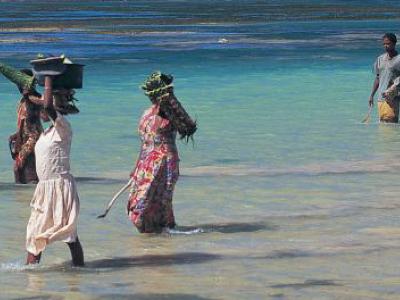Thematic area

Droughts, floods, changing rainfall patterns, and other extreme weather events put vulnerable communities at risk. With improved access to climate information, new technologies, and advanced land and water management techniques, vulnerable communities are receiving the tools they need to feed their families today, tomorrow and into the future. This service line addresses the risks of climate change across the value chain – especially agricultural products that are important to food and nutrition security. The main areas of work include pre-production and input management; capacity to provide and apply climate information services; production and diversified integrated systems; and post-production offerings including the provision of financial services and access to markets.
Stories
Partnerships
The UNDP Green Commodities Programme exists to improve the national, economic, social, and environmental performance of agricultural commodity sectors.
The purpose of this centre is to provide a fast-tracked, demand-driven mechanism for African countries to access grant resources that support policies, initiatives, and best practices on climate change, food security, access to water, and clean energy, accelerating progress on the Sustainable Development Goals (SDGs).
Resources
The Tourism Authority of Kiribati (TAK) in collaboration with the Business Promotion Unit of the Ministry of Tourism, Commerce, Industry and Cooperatives (MTCIC) continued its community-based tourism programme on Nonouti Island from 14 – 31 October 2022. Through this mission, the team worked with participating communities to develop their community-based tourism business plans. This included consultation with participating communities on business name ideas, package and pricing and other necessary information required for the business plan completion.
On September 24, a team from the Ministry of Tourism, Commerce, Industry and Cooperatives (MTCIC) departed Tarawa for Abemama island. The mission lasted for 21 days with the purpose to undertake training, consultation, and awareness to strengthen business initiatives through increasing trade from local products and value-added products from in-land and marine resources to enhance food security under the impacts of climate change.
















